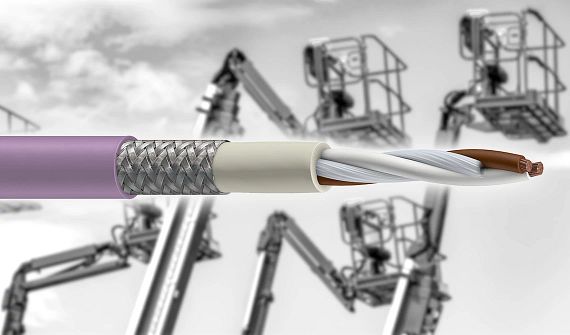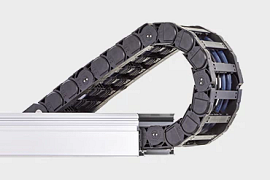CAN bus cable for moving applications
What are CAN bus cables?
Controller Area Network (CAN) bus is a fieldbus system developed by Bosch, which partnered with Intel to introduce it in 1986. The goal was to reduce the cable harnesses in cars in order to reduce cost and weight. Over time, various CAN protocols became established, especially in security-related areas. In 1994, Bosch headed the introduction of the CANopen protocol for automation technology.
Would you like more information about CAN bus cables or do you need an individual consultation? Our experts will be happy to get in touch with you.
Contact an expert
CAN bus cable examples
chainflex® bus cable CFBUS.LB
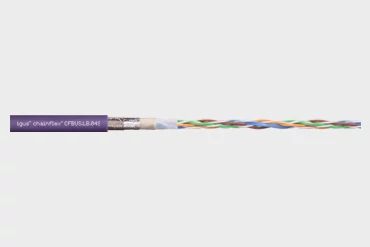
- Requirements: Extremely heavy duty applications
- Outer jacket: TPE
- Overall shield
Buy now!
chainflex® bus cable CF888
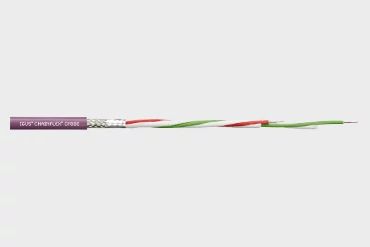
- Requirements: For flexing applications
- Outer jacket: PVC
- Overall shield
Buy now!
Shop all CAN bus cables
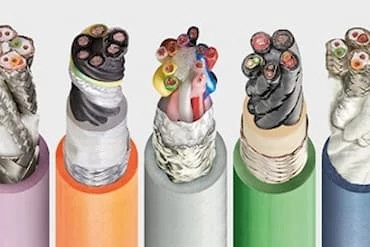.jpg?crop=no&color=ffffff00&w=370&quality=80)
Buy now!
igus® cables for CAN bus applications energy chain applications require CAN bus cables with fine stranded wires. A cable structure tailored to movement in energy chains is also necessary to guarantee secure data transmission over the years. This is why chainflex® cables have become established especially in equipment and machines such as robots, packaging machines, production machines, and machine tools.
The igus® chainflex® cable product range includes a variety of CAN bus cables. A total of 13 different CAN bus cable types from seven different cable ranges are available for different application areas. All chainflex CAN bus cables have been developed for continuous movement in energy chains. Depending on your requirements, you can choose among different PVC, PUR, and TPE outer jackets. The various bus cable series offer different performance levels, so that the right cable can be chosen for each application area in order to maximise service life. All chainflex® CAN bus cables have one thing in common. All chainflex® cables are subject to the same quality standards, from cost-effective CF888 cables to cables for the highest demands and smallest bend radii, as is the case with the CFBUS.LB range. igus® GmbH therefore also gives a 36-month functional guarantee on all chainflex® CAN bus cables with a service life of up to ten million double strokes.
Transmission lengths The topic of maximum bus cable transmission length is often underestimated. In general, caution should be exercised, since the maximum cable length can be strongly linked to cable type. A cable for fixed installation always has a lower dampening than flexible cables, which are designed for constant movement. As a result, the transmission length is shorter than with a cable for fixed installation.
Depending on cable range, chainflex® CAN bus cables are mechanically designed for travels of up to 400m or more, but bus system data rate decreases as cable length increases. For fixed installation, copper cables can reach up to 500m. Then the maximum transmission speed is still 125Kbps, while a cable length of 40m still allows a data transfer rate of 1Mbps. Our experience with highly flexible CAN bus cables for energy chains shows that cable length can be significantly shorter. Depending on transmission speed, a moving CAN bus cable can be up to 50m. However, this length may vary up and down depending on environmental conditions and application requirements.
The igus® chainflex® cable product range includes a variety of CAN bus cables. A total of 13 different CAN bus cable types from seven different cable ranges are available for different application areas. All chainflex CAN bus cables have been developed for continuous movement in energy chains. Depending on your requirements, you can choose among different PVC, PUR, and TPE outer jackets. The various bus cable series offer different performance levels, so that the right cable can be chosen for each application area in order to maximise service life. All chainflex® CAN bus cables have one thing in common. All chainflex® cables are subject to the same quality standards, from cost-effective CF888 cables to cables for the highest demands and smallest bend radii, as is the case with the CFBUS.LB range. igus® GmbH therefore also gives a 36-month functional guarantee on all chainflex® CAN bus cables with a service life of up to ten million double strokes.
Transmission lengths The topic of maximum bus cable transmission length is often underestimated. In general, caution should be exercised, since the maximum cable length can be strongly linked to cable type. A cable for fixed installation always has a lower dampening than flexible cables, which are designed for constant movement. As a result, the transmission length is shorter than with a cable for fixed installation.
Depending on cable range, chainflex® CAN bus cables are mechanically designed for travels of up to 400m or more, but bus system data rate decreases as cable length increases. For fixed installation, copper cables can reach up to 500m. Then the maximum transmission speed is still 125Kbps, while a cable length of 40m still allows a data transfer rate of 1Mbps. Our experience with highly flexible CAN bus cables for energy chains shows that cable length can be significantly shorter. Depending on transmission speed, a moving CAN bus cable can be up to 50m. However, this length may vary up and down depending on environmental conditions and application requirements.

CAN bus cable in the test lab of igus
CAN bus cables are available for different fields of application. In general, CAN bus cables are often installed fixed in machinery and equipment, so that cables with a solid conductor or a flexible conductor consisting of 7 strands can be selected.

CAN bus cable application in harvesting technology
The special machines of Josef Zeyer GmbH wash, weigh and pack vegetables and lettuce directly in the field. They are controlled by a wired remote control device connected to the vehicle by chainflex cables from igus. All relevant functions for drive and steering are electronically controlled via CAN bus cable.
Are you looking for an chain for your cable?
Find your e-chain®
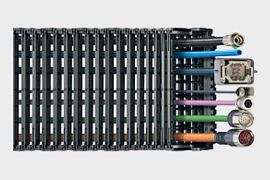
.....or do you require a fully harnessed version?
To the readychain
